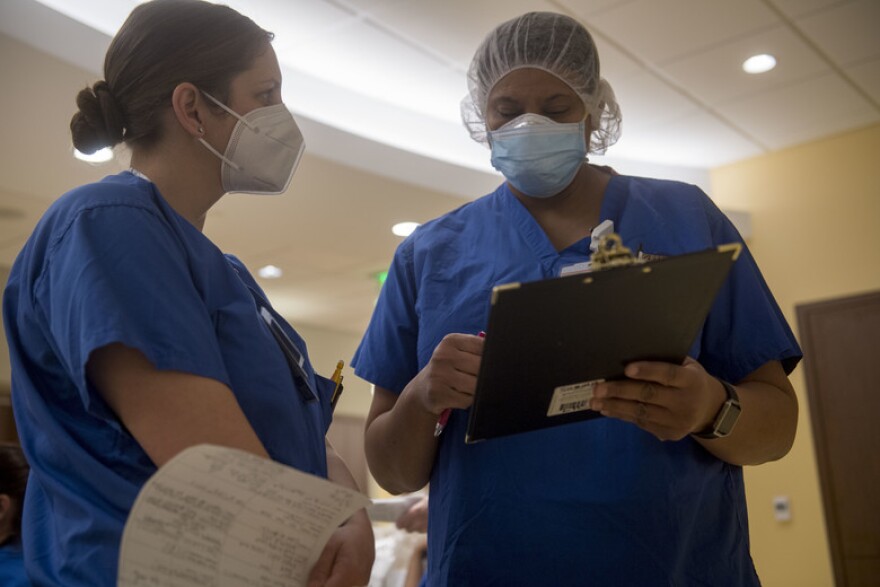Around 1,000 workers at a dozen Metro Detroit nursing homes could go out on strike soon.
Nothing has been decided yet. But unionized workers represented by the Service Employees International Union (SEIU) at the facilities say contract talks have stalled, and they feel they may have no choice but to strike.
Colleen Mahony is one of those workers. She’s a licensed practical nurse at Pine Creek Manor in Wayne, which is owned by Pioneer Health Care Management. Pioneer runs two of the nursing homes where SEIU workers have threatened to strike. The company did not respond to an email seeking comment.
Mahony said the union contract at Pine Creek Manor expired last June, and talks have not progressed significantly since then.
“When I sat in on them, there was no negotiation happening. The company basically said no to every proposal that the union made,” said Mahony. She said workers there are seeking a better wage structure for all employees, as well as more affordable benefits and a paid time off program.
“We’re asking for reasonable accommodations here, for reasonable compensation, and the company is not even entertaining the discussion,” she said. “So then we have to consider the next logical step.”
But a group that represents the nursing care industry in Michigan said many facilities are in a bind right now, facing a full-blown staffing and financial crisis.
Michigan nursing homes have lost as many as 10,000 workers since the start of the COVID-19 pandemic, said Melissa Samuel, CEO of the Health Care Association of Michigan. The lack of staff has made it difficult for facilities to take more patients, cutting into their revenue.
The lack of workers has forced facilities to pay higher wages, on top of other costs driven up by inflation, Samuel said. “We’ve done a lot as far as benefits, wages, flexible schedules, all of that,” she said. “I mean, we'll continue to do that because again, we have to retain these workers and we have to attract new workers.”
Compounding that, “Most facilities are operating on very tight budgets because Medicaid reimbursements rates have fallen below the actual costs of care,” according to Samuels' association. “Since 2019 Medicaid reimbursement rates have only increased 5% in Michigan, falling far behind the 15% or more increase in costs that facilities face.”
Samuel said the state Legislature could step in and change the Medicaid reimbursement rates, and should do so. She added that $67 million in state grant funds meat to promote workforce retention and recruitment at skilled nursing facilities have yet to be disbursed.
“Providers are striving to fill open positions and retain current employees — offering increased wages, strengthening benefits, providing flexible schedules, and much more — but the workers simply are not there,” Samuel said. “A strike could be catastrophic to care.”
But that’s not true across the board, argued Kevin Lignell, an SEIU spokesman. While some nursing homes have been accommodating and contract talks successful, “this is a unique group of nursing homes which are stubbornly nickel and diming workers,” he said. “So that's why we've chosen to [potentially] go on strike.”
Strike votes have not yet been held in all those facilities, and there’s no set timeline for doing so, Lignell said. “We want to make sure that there's still time to bargain and that we get to last best offers,” he said.
Mahony, the licensed practical nurse at Pine Creek Manor, said nursing home workers who have stuck with their jobs through the pandemic “deeply care about the work that we do.” But she said they can only sacrifice so much.
“We feel like we've gone over and above to try and get these companies through this unprecedented time. And we don't think that it's unreasonable for us to ask to be compensated fairly for it,” Mahony said.
“The cost of everything has gone up for everybody, including us. And that money needs to trickle down to the people at the bottom who are doing the literal work on the floor.”




